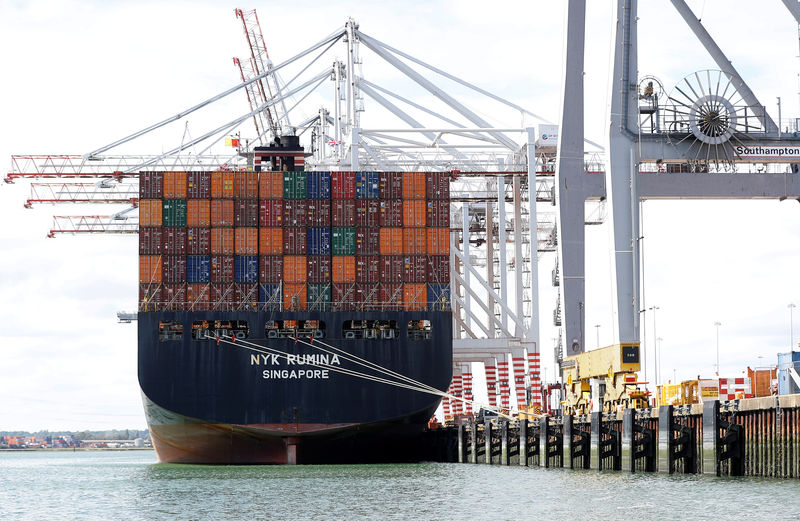By David Milliken
LONDON (Reuters) - Britain's current account deficit, the largest of the world's major economies, is no longer on course to narrow significantly over the next five years, putting sterling at risk of a further big fall, according to government experts.
Bank of England Governor Mark Carney warned last year that Britain's dependence on around 100 billion pounds a year of foreign financing left it reliant "on the kindness of strangers".
That risk seemed to diminish when sterling fell more than 10 percent after the Brexit vote in 2016.
While the decision to leave the European Union raised big questions about Britain's economy, the weaker pound led many economists, including the government's Office for Budget Responsibility, to predict the current account gap would narrow sharply.
The fall in sterling would reduce the imbalance between returns on British investments held abroad and those held in Britain by foreign investors, a big contributor to the deficit, they said.
This week, the budget office changed its mind.
In its twice-yearly forecast of the public finances, the OBR predicted the current account deficit would total 101 billion pounds in 2021, or 4.4 percent of GDP, rather than fall to 47 billion pounds or 2.0 percent of GDP as it thought in March.
This year, the deficit is expected to be about 4.6 percent of GDP, having hit a record 5.9 percent in 2016, when the only European countries with a bigger deficit than Britain's were Albania and Montenegro, according to World Bank data.
The OBR told chancellor Philip Hammond that Britain needed to guard against losing foreign investors' confidence, for example through a "disorderly" Brexit process.
"That could lead to a sharp fall in sterling, bringing about a more abrupt demand-led narrowing of the current account deficit and a subsequent spike in inflation," it said.
The finance ministry's acting chief economic advisor, Richard Hughes, said overseas investors had long supported Britain.
"We've managed to sustain a fairly large current account deficit in the UK for many years, indeed in some cases for decades," he told an audience of economists on Thursday.
Britain still had profitable overseas investments, and its government debt enjoyed strong foreign demand, he added.
Robert Stheeman, chief executive of the UK Debt Management Office, said on Wednesday that demand for government debt had held up "remarkably well" since the Brexit vote.
CURRENCY CRISES
Countries which suffer balance of payments crises are typically emerging market economies that issue foreign-currency debt, or are in fixed exchange rate regimes, as Britain was when it ran into trouble in the 1960s and 1970s, culminating in a bailout from the International Monetary Fund.
Nonetheless, David Page, an economist at AXA Investment Managers, said the OBR forecast left no room for complacency.
"That's a very elevated level for a long period of time," he said. "There is a significant downside risk to sterling."
He expected Britain's departure from the EU to ultimately create barriers to British exports and curb foreign investment.
The new OBR forecast is due to gloomier assumptions about Britain's future net investment income -- the difference between returns on British investments abroad, and the dividends and interest paid to foreign investors in British companies and government debt.
Historically, Britain ran a surplus on net investment income. But this went into reverse during the global financial crisis and the gap has widened rather than return to trend, in part because British interest rates have been higher than those in the euro zone.
Economists had expected that a stronger euro zone economy would help rebalance this deficit but the OBR said it was not enough. Bigger-than-thought interest payments to foreign holders of British corporate debt were also a factor, it added.
Furthermore, the OBR's new forecast for a productivity slowdown across the whole economy will hamper exports, something that last year's fall in the pound will not fully offset.
One thing that has not changed is the OBR's assumptions about Brexit, both in terms of its impact on trade and on Britain's budget contributions to the EU.
Sam Hill, an economist at RBC Capital Markets, said a big current account deficit did not automatically put further pressure on sterling. But it did raise the risk of a slide if something went wrong.
"Markets don't necessarily care too much about current account deficits all the time, but when they choose to ... it is pretty much the only thing they care about," he said.

GRAPHIC-Britain's current account deficit: https://product.datastream.com/dscharting/gateway.aspx?guid=ceb03a14-9fab-4283-a0e4-ba16c9635084&action=REFRESH